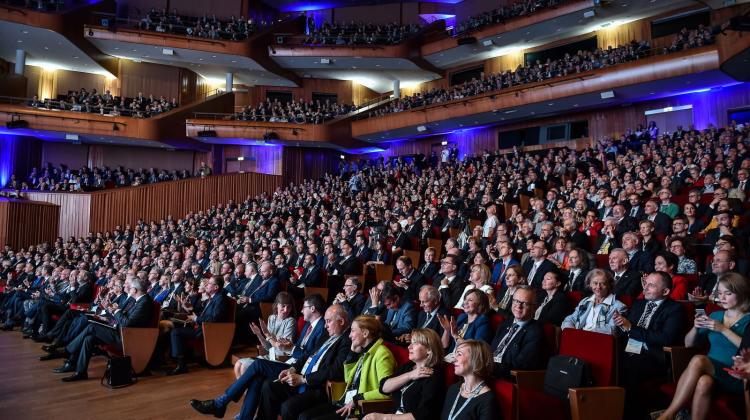Rectors: In general terms, the law on education meets our expectations
 Participants of the National Congress of Science at ICE Kraków Congress Centre. Minister Jarosław Gowin presented the new draft law on higher education and science, so-called Law 2.0. Photo: PAP/Jacek Bednarczyk.
Participants of the National Congress of Science at ICE Kraków Congress Centre. Minister Jarosław Gowin presented the new draft law on higher education and science, so-called Law 2.0. Photo: PAP/Jacek Bednarczyk.
In general terms, the law on science and higher education meets the expectations of our community - the rectors of several universities said in a conversation with PAP. According to the rectors, the provisions in the document still require analysis and refining, which is expected to happen in the future.
On Tuesday at the National Congress of Science in Kraków, Deputy Prime Minister, Minister of Science and Higher Education Jarosław Gowin presented the assumptions of a new draft law on higher education and science, so-called Law 2.0, also known as the "Constitution for Science".
The rectors of universities with whom PAP spoke on Tuesday said that in general the legislation meets the expectations of the university community, but time and further consultation are needed to refine the document.
"The main postulates of the community, such as the preservation of university autonomy and strengthening the rector\'s position, have been included in the project" - said Rector of the Jagiellonian University Prof. Wojciech Nowak.
As he noted, in the near future, after a detailed review of the document, there will be time for criticism and praise. "In general terms, the law meets our (academic community\'s - PAP) expectations, but there are provisions that require improvement" - he admitted.
According to the Rector of the Jagiellonian University, the division of duties between the senate, the board and the rector of the university may raise doubts. "It will need to be clarified" - he emphasised.
He expressed a positive opinion with regard to the proposed extension of the duration of extramural studies - bachelor\'s and supplementary master\'s by 1 semester, and uniform master\'s by two semesters. "Graduates of full-time and part-time studies should have the same knowledge and skills" - he pointed out.
Rector of AGH University of Science and Technology Prof. Tadeusz Słomka declared that he "receives the bill positively". In his opinion, university have a lot of work ahead of them. "The university system will have to change, the university board will appear - and here are doubts to what extent it will limit the rector\'s power, which is supposed to be much greater" - wondered Słomka.
In his assessment, the changes in education will be an "absolute revolution". "Faculties may virtually disappear" - wondered the Rector of AGH. He also admitted that he was glad about the announcement of the continued funding for universities.
In turn, the Rector of the University of Silesia Prof. Andrzej Kowalczyk said that the "constitution for science" is an important and necessary undertaking.
"In recent years, there has been a sort of perceptible blissfulness in our community. But we have to develop, because the world is competitive, open, so we need adjustments, new mechanisms, international outreach" - Kowalczyk said.
According to Kowalczyk, there will be reservations about certain provisions of the law, such as the selection of the rector and the management of the university. "The law will expand the internal autonomy of universities, but as far as relations with the environment are concerned, there can be doubts because if the university board is to nominate rector candidates, and representatives of the environment outside the university are the majority, then there will be doubts here" - said the Rector of the University of Silesia.
He acknowledged that he was pleased with the announcement of expanding the rector\'s competence. "I\'m not talking about myself, but about future rectors. Until now the rector\'s responsibility was very high, while the possibility of influencing the decisions was limited" - pointed out Prof. Kowalczyk.
Beata Kołodziej (PAP)
PAP - Science and Scholarship in Poland
bko/ agt/ kap/
tr. RL
Przed dodaniem komentarza prosimy o zapoznanie z Regulaminem forum serwisu Nauka w Polsce.


















